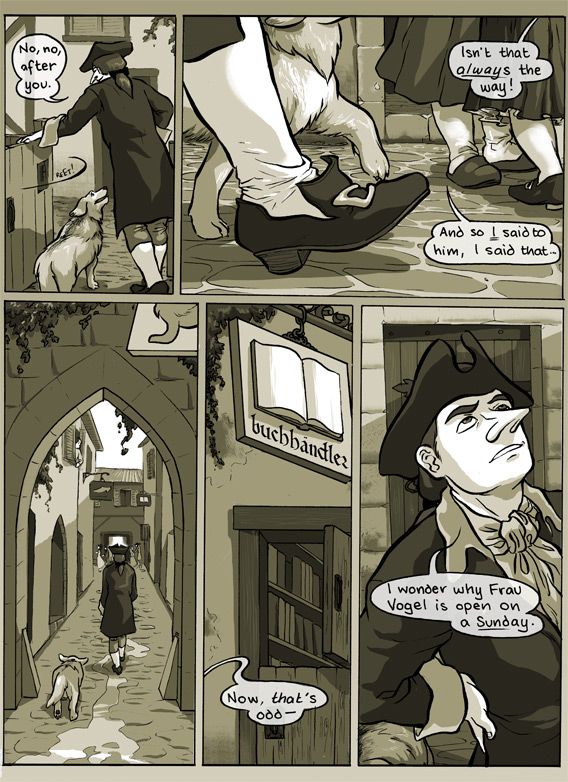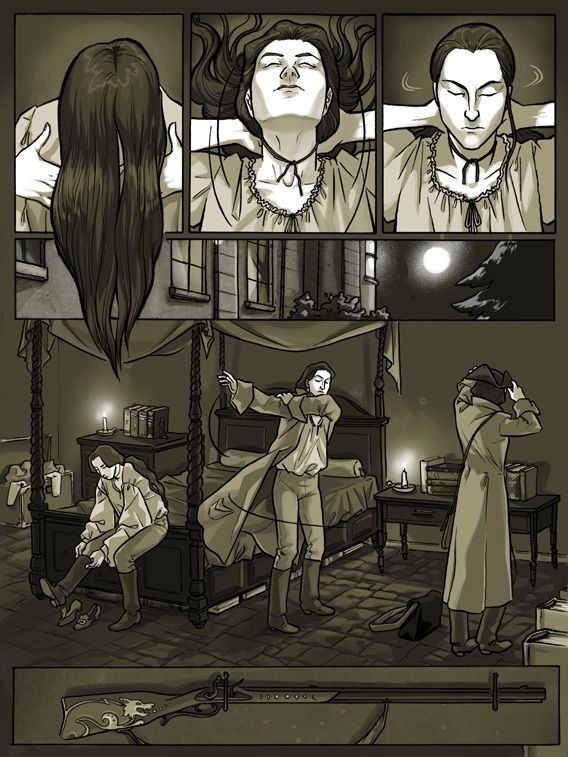by Dylan Meconis
In Family Man, Dylan Meconis has created a convincing, historically accurate world peopled with characters who feel solid and real, the sort of people you would enjoy hanging out with after dinner and well into the night.
Except, maybe, during a full moon.
Set in 1768, Family Man follows the fortunes of Luther Levy, who was a theology student at the University of Gottingen, in Germany, until he learned the hard way that asking too many questions—and not being able to give the right answers—can get you in trouble. As the story opens, Luther has moved back to the family home, where he is creating a bit of hardship by occupying a room that could otherwise be rented out.
The Levys are an interesting family, blessed more with brains than money or social status. Luther’s father, Avner, is a Jew who converted to Christianity when he married Luther’s mother, Veronika. Avner is a clockmaker; he has filled the house with clocks, which all go off at different times, and he wanders through the story tinkering, adjusting, and delivering little lectures. Veronika is stuck in the role of enforcer, although her strictness is tempered with affection. Until recently, Luther has been the good son, going toward the church while his twin brother Johann took a more worldly path and became a merchant. Liesl, the baby of the family, is bratty and intelligent, indulged by the others but not taken too seriously.
Now Luther has lost the patron who was paying for his education, and he is looking at a rather grim career as a tutor when he meets Lucien, who is sort of a traveling scout for a rural university. This meeting doesn’t seem to be entirely by chance, and Lucien invites Luther to teach at the university. It doesn’t take much to persuade him.
In fact, the Enlightenment is well under way at the University of Familienwald The library is a converted church, and the librarian is a woman, Ariana Nolte. Ariana’s father, Jakob, is the rector of the university, and he takes a liking to Luther right away. (So does Ariana, apparently, but Lucien warns that that path is fraught with peril.) However, there are hints all over the place of darker things to come, and Meconis has said that the story will take a supernatural turn, but I almost wish it wouldn’t, as I’m enjoying this little academic soap opera quite a bit.
Everything about this story feels right. Meconis really captures the feeling of an old German town, for instance—not just the architecture and the details but also the sense of scale, the feeling of walking down a narrow street with buildings crowding in on either side. And the church-library is breathtaking.
The characters seem real as well. The Levys suffer socially and financially because Avner is a Jew, converted or not, and Veronika, who is genuinely devout, feels betrayed and bewildered when Luther moves away, both spiritually and physically. Yet they are affectionate, despite the occasional squabble, and they clearly enjoy each other’s company. Their conversations always feel natural, the comfortable talk of smart people who spend a lot of time in each other’s company.
Luther himself is an easy character to like. He's straightforward and guileless to a fault, unable to conceal his doubts or play academic games, yet capable of transfixing his students with a dramatic lecture on the gospel of John.
Ariana and Jakob Nolte are more enigmatic. Ariana is steely and determined, while Jakob radiates gentle, grey-haired charm, but something is not quite right with these two, and Luther is only starting to sense it.
Meconis’s art is realistic in a gestural but not photographic sort of way, with enough detail to pull you into the scenes but not so much as to overwhelm them. She gives the reader plenty of interesting things to look at—solid characters, of course, but also wonderful period details and quirky clockworks. This isn’t mere eye candy, though. Meconis has a solid sense of design, and her well thought out pages are a powerful storytelling tool.
As an added bonus, Meconis has gone the extra mile and annotated the comic. Her notes are mostly historical information, although she adds some insight into the characters and their backstories as well. (It’s a sign of her thoroughness that Meconis knows all about the lady who owns the local bookstore, who appears in maybe three or four panels, tops.) The notes provide just enough interesting detail without going overboard. I’m not interested in reading the whole Wikipedia article on Spinoza, but I love the way Meconis boils his story down to its essentials and serves it up with wit and intelligence.
There are only two things that detract from this comic. The first is Luther Levy’s nose, which is enormous to the point of being distracting. Meconis, with her usual thoroughness, discusses this in the notes, but it’s still a bit much, especially in the early part of the story. The other problem is simply that there isn't enough. The story is unfolding slowly, and Meconis updates at the glacial pace of one page a week. After two chapters and a prologue, it feels like all the pieces have been set into place and the main action is just beginning. As delightful as it is to linger over the details of Family Man, I'm ready to move on and find out exactly what Meconis has planned for Luther and the others.



